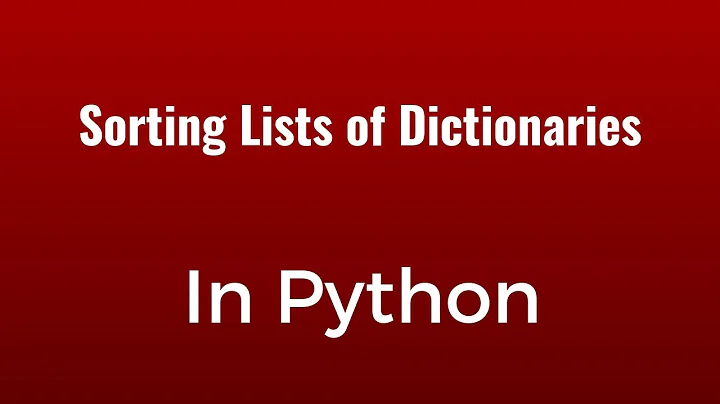How to custom-sort a list of dict to use in json.dumps
Solution 1
Since python dicts are unordered collections, use collections.OrderedDict with a custom sort:
from collections import OrderedDict
import json
allsites = [
{
'A5': 'G',
'A10': 'G',
'site': 'example1.com',
'A1': 'G'
},
{
'A5': 'R',
'A10': 'Y',
'site': 'example2.com',
'A1': 'G'
}
]
sort_order = ['site', 'A1', 'A5', 'A10']
allsites_ordered = [OrderedDict(sorted(item.iteritems(), key=lambda (k, v): sort_order.index(k)))
for item in allsites]
data = {'Author': "joe", 'data': allsites_ordered}
print json.dumps(data, indent=4, separators=(',', ': '))
prints:
{
"data": [
{
"site": "example1.com",
"A1": "G",
"A5": "G",
"A10": "G"
},
{
"site": "example2.com",
"A1": "G",
"A5": "R",
"A10": "Y"
}
],
"Author": "joe"
}
Solution 2
In Python3, alecxe's answer no longer works. This should be a comment, but I lack the reputation.
PEP 3113 removed tuple unpacking in function signatures, so the line
allsites_ordered = [OrderedDict(sorted(item.iteritems(), key=lambda (k, v): sort_order.index(k)))
for item in allsites]
now has to be
allsites_ordered = [OrderedDict(sorted(item.items(), key=lambda item: sort_order.index(item[0])))
for item in allsites]
or similar. iteritems has also become just items.
Solution 3
I had exactly the same problem and devised a lightweight general solution:
from collections import OrderedDict
def make_custom_sort(orders):
orders = [{k: -i for (i, k) in enumerate(reversed(order), 1)} for order in orders]
def process(stuff):
if isinstance(stuff, dict):
l = [(k, process(v)) for (k, v) in stuff.items()]
keys = set(stuff)
for order in orders:
if keys.issuperset(order):
return OrderedDict(sorted(l, key=lambda x: order.get(x[0], 0)))
return OrderedDict(sorted(l))
if isinstance(stuff, list):
return [process(x) for x in stuff]
return stuff
return process
First, you create an instance of a custom-order sorting function:
custom_sort = make_custom_sort([ ["site", "A1", "A5", "A10"] ])
Now, the actual sorting:
result = custom_sort(allsites)
... which you may dump as a JSON object:
print json.dumps(result, indent=4)
Result
[
{
"site": "example1.com",
"A1": "G",
"A5": "G",
"A10": "G"
},
{
"site": "example2.com",
"A1": "G",
"A5": "R",
"A10": "Y"
}
]
More
The closure is recursive. As indicated by the double brackets, you could specify as many sort orders as the various dictionaries nested in your structure would require.
Project on GitHub: https://github.com/laowantong/customsort
Related videos on Youtube
WoJ
Updated on July 09, 2022Comments
-
WoJ almost 2 years
I have a list similar to
allsites = [ { 'A5': 'G', 'A10': 'G', 'site': 'example1.com', 'A1': 'G' }, { 'A5': 'R', 'A10': 'Y', 'site': 'example2.com', 'A1': 'G' } ]Which I use in a
json.dumps:data = { 'Author':"joe", 'data':allsites } print json.dumps(data,sort_keys=True,indent=4, separators=(',', ': '))This outputs the following JSON:
{ "Author": "joe", "data": [ { "A1": "G", "A10": "G", "A5": "G", "site": "example1.com" }, { "A1": "G", (...)I would like the "data" section of this JSON string to be sorted via a custom key ("alphabet"), in the case above this would be
site, A1, A5, A10and actually look like:{ "Author": "joe", "data": [ { "site": "example1.com", "A1": "G", "A5": "G", "A10": "G" }, { "site": "example2.com", "A1": "G", (...)I read about custom sorting in the Sorting FAQ but it just gives a way to override the comparison function, not to mention that I do not know how to insert this into my code.
How to do that?
-
Rodrigo over 7 yearsDon't work more for python3, @alecxe, it say: "tuple parameter unpacking is not supported in python 3". See Scott Answer.
-
Charles Merriam over 6 yearsAnd in Python 3.6, the dict is now ordered by default. That is, it works and somehow we shouldn't "plan on it working".
-
 Scott Colby over 6 years@CharlesMerriam Agreed. There's a bit of absurdity surrounding dictionary ordering at the moment. The biggest issue, I suppose, is that non-CPython implementations of the language might not have "gotten things in order yet" so to speak.
Scott Colby over 6 years@CharlesMerriam Agreed. There's a bit of absurdity surrounding dictionary ordering at the moment. The biggest issue, I suppose, is that non-CPython implementations of the language might not have "gotten things in order yet" so to speak. -
 Scott Colby over 5 yearsSmall update: as of Python 3.7, the
Scott Colby over 5 yearsSmall update: as of Python 3.7, thedictis ordered by default and we can count on it--it's become part of the spec. There still is an argument to be made for using anOrderedDictas a semantic indicator that you're using the ordering property. Additionally, theOrderedDictkeeps its extrapopitem()andmove_to_end()methods that the builtindictstill lacks. More details in this answer: stackoverflow.com/a/50872567/600882








